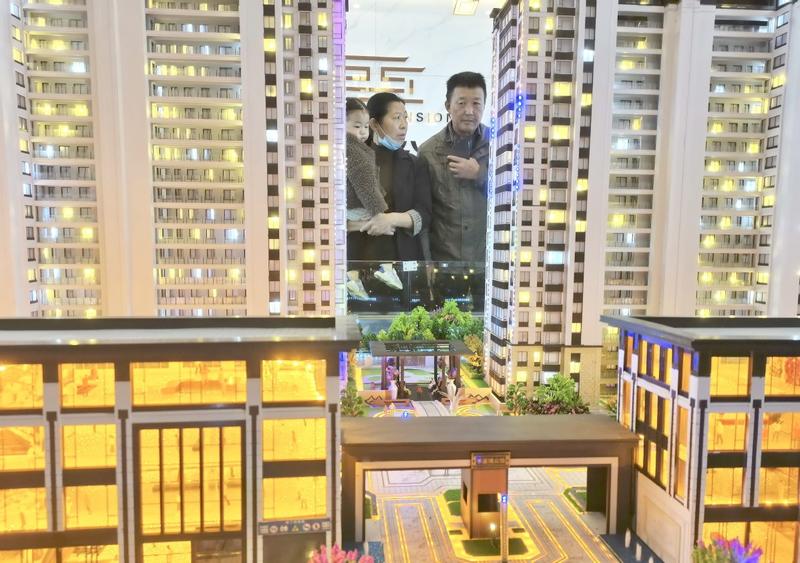 This undated file photo shows potential homebuyers looking at a property model in Huaian, Jiangsu province. (PHOTO BY CHEN LIANG / FOR CHINA DAILY)
This undated file photo shows potential homebuyers looking at a property model in Huaian, Jiangsu province. (PHOTO BY CHEN LIANG / FOR CHINA DAILY)
The property market is still a ballast for sustaining China's investment and economic growth as well as the Chinese people's well-being under the dual-circulation development scenario, an industry expert said.
"The nation is witnessing rapid urbanization, characterized by the new round of restructuring and development of city clusters. New industries and population are flocking to these clusters, thereby boosting the prospects of the real estate sector," said Yu Xiaofen, vice-president of the Zhejiang University of Technology.
According to Yu Xiaofen, vice-president of the Zhejiang University of Technology and the dean of the Chinese Academy of Housing and Real Estate, local governments must increase the supply of rental apartments so that people can choose their living requirements based on their consumption capability.
Yu, who is also the dean of the Chinese Academy of Housing and Real Estate at the university, said substantial opportunities exist for real estate development as a result of the dual-circulation development pattern in the 14th Five-Year Plan period (2021-25), particularly in new urbanization, rental housing, upgrade of existing properties and extension of the real estate industrial chain.
Lu Min, a professor with Shanghai Jiao Tong University, said in a recent interview that though China's urbanization rate has reached 60 percent after decades of development, it is still up to 30 percent behind some developed nations. "Future urbanization should be more focused on the integrated development of various city clusters," said Lu.
In December, the annual Central Economic Work Conference reiterated that promoting rental housing would be one of the key priorities for this year. According to Yu, rental housing is important as it helps address the housing woes of the huge migrant population in the country.
ALSO READ: Urban rental housing keyword in annual two sessions
Nearly 133 million migrant people live in rented flats, said a survey conducted by the Ministry of Housing and Urban-Rural Development in 2018. The migrant people plus urban residents who live in rental homes amount to 180 million tenants, accounting for 12.88 percent of the nation's total population, the ministry said.
Hui Jianqiang, head of research at Beijing Zhongfang-Yanxie Technology Service Ltd, believes that rental housing is an ideal solution for newcomers to a city as they cannot afford the existing high home prices.
According to Yu, local governments must increase the supply of rental apartments so that people can choose their living requirements according to their consumption capability.
Currently, the rental housing market face three main problems: high operating costs, management risks and profit uncertainties. The central government's assurance of enacting more favorable policies for the rental housing sector will motivate developers to attach equal importance to selling and leasing properties, said Yu.
READ MORE: Housing woes in key cities to get top priority
China's robust development and economic momentum will continue to stabilize property prices in coming years, with home prices and sales expected to see steady growth. Upgrade of existing properties, city redevelopment, and diversified property development via elderly care, leisure and tourism, and medical care will create several growth opportunities for the real estate sector this year, said Yu.



